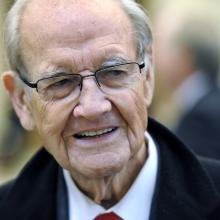anti-war
You can’t blame me for flinching
back against the wall
when a small boy points his
pistol at me and yells “Pow! Pow! Pow!”
I am lying back there somewhere
feeling the sidewalk as if I’d never touched
sunshine, pumping out my urgent
puddle
Times reporter Edward B. Fiske observed how conservative evangelical Protestants supported the war. Many, like the theologian and editor of Christianity Today, Carl F. Henry, believed it to be morally defensible. Fiske wrote that “the majority of laymen and clergy in this country” were more in agreement with Carl Henry than with William Sloane Coffin.
“JUST WAR IS KILLING US! There is no just war.”
That proclamation by a Catholic sister from Iraq, and others like it, resounded at a Vatican gathering this spring and fell on surprisingly receptive ears.
Sister Nazik Matty, an Iraqi Dominican, joined others from around the world in Rome in April to wrestle with how the Catholic Church could “recommit to the centrality of gospel nonviolence.” She has watched members of her religious community die for lack of medical care during war.
“Which of the wars we have been in is a just war?” asked Sister Matty, who was driven from her home in Mosul by ISIS, also known by the Arabic acronym Daesh. “In my country, there was no just war. War is the mother of ignorance, isolation, and poverty. Please tell the world there is no such thing as a just war. I say this as a daughter of war.”
The Rome gathering on Nonviolence and Just Peace was unprecedented, bringing together members of the church hierarchy with social scientists, theologians, practitioners of nonviolence, diplomats, and unarmed civilian peacekeepers to discuss Catholic nonviolence and whether in the contemporary world armed force can ever be justified.
Of course, with such diverse participants, there was not a common mind on whether just war theory, a doctrine of military ethics used by Catholic theologians, has outlived its usefulness as church teaching.
Some of the academics and diplomats—particularly from the United States and Western Europe—maintained that just war criteria, when properly applied, are useful when working within halls of power, from the Pentagon to the United Nations, for restraining excessive use of military force by a state. One participant cautioned against “broad condemnations of just war tradition, if it means closing off dialogue with our allies.” Another questioned how diplomacy could continue without the just war framework as its common language.
But Catholics who came to Rome from conflict zones—Afghanistan, Iraq, Pakistan, Palestine, Colombia, Mexico, the Democratic Republic of Congo, Burundi, and Uganda—brought a different perspective.
As the United States prepares to “officially” become involved in the Syrian war, Christian pacifism has reemerged as a much-discussed and relevant topic. Unfortunately, the concept has been somewhat misrepresented, undervalued, and often downright demonized within evangelical communities.
Critics often assume Christian Pacifism is some sort of radical political movement associated with marijuana-smoking hippies who are anti-government conspiracy theorists. To make matters worse, pop-culture (and much of Christian culture) has made pacifism seem, well, passive — as if pacifists are unpatriotic and un-American heretics who refuse to enlist in the military and avoid physical confrontations at all costs. They are characterized and perceived as weak, scared, and gutless.
In reality, the beliefs that form Christian pacifism are spiritual and scripturally founded around the life of Christ. And whether you agree with the theology, it’s hard to passively dismiss the Biblical argument for pacifism as some sort of crazy mumbo-jumbo.
I will miss George McGovern. The former senator from South Dakota and Democratic presidential candidate in 1972 died in a hospice on Sunday, at 90, surrounded by family and friends who loved him.
Indeed, many of us did.
1972 was the first year I was old enough to vote in an election, and McGovern was the first presidential candidate for whom I voted.
To this day, I am more proud of that vote than most of the others I have cast since.
Some of McGovern’s people contacted me while I was still at seminary during the 1972 campaign. They wanted McGovern to have a chance to meet and talk with evangelical Christians, since his own Christian faith was very important to him — being the son of a Methodist minister and even having studied for a divinity degree himself for a while before deciding to go into teaching history. I agreed to help.
They couldn’t understand why most evangelicals at the time were for Richard Nixon, a man who turned out not to be one of the U.S.'s most honest, humble, or deeply religious presidents.




